#TravelScrapingAPI
Explore tagged Tumblr posts
Text
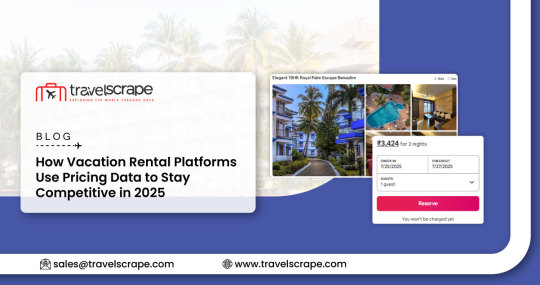
Vacation Rental Pricing Data: Stay Competitive in 2025
Learn how vacation rental platforms use real-time pricing data and scraping tools to optimize rates and drive bookings in 2025 competitive market.
#DataToStayCompetitiveIn2025#VacationRentalPlatformsUsePricingData#ExtractingVacationRentalPricingData#ScrapeVacationRentalReviews#WebScrapingForTravelReviews#TravelScrapingAPI#RealTimeData#TravelWebScrapingServices#TravelAggregatorDataScraping
0 notes
Text
Learn how vacation rental platforms use real-time pricing data and scraping tools to optimize rates and drive bookings in 2025 competitive market.
#DataToStayCompetitiveIn2025#VacationRentalPlatformsUsePricingData#ExtractingVacationRentalPricingData#ScrapeVacationRentalReviews#WebScrapingForTravelReviews#TravelScrapingAPI#RealTimeData#TravelWebScrapingServices#TravelAggregatorDataScraping
0 notes
Text
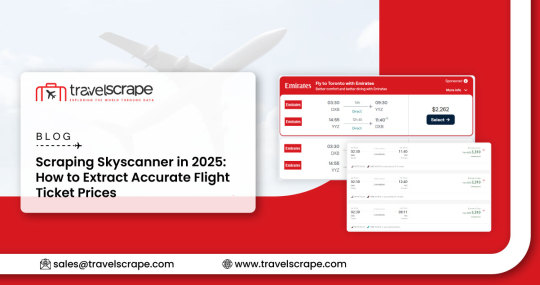
Learn how to extract accurate flight ticket price data from Skyscanner in 2025 using modern web scraping tools and ethical methods.
#ScrapingSkyscannerIn2025#ExtractAccurateFlightTicketPrices#HowToExtractFlightTicketPriceData#ExtractingFlightTicketPriceData#TravelAggregatorsDataScraping#FlightPriceDataScraping#TravelWebScrapingServices#OTADataScraping#TravelScrapingAPI
0 notes
Text
Skyscanner Scraping Guide 2025: Extract Flight Prices
Learn how to extract accurate flight ticket price data from Skyscanner in 2025 using modern web scraping tools and ethical methods.
#ScrapingSkyscannerIn2025#ExtractAccurateFlightTicketPrices#HowToExtractFlightTicketPriceData#ExtractingFlightTicketPriceData#TravelAggregatorsDataScraping#FlightPriceDataScraping#TravelWebScrapingServices#OTADataScraping#TravelScrapingAPI
0 notes
Text
Flight Price Intelligence 2025: Real-Time Data for Travel Platforms
Introduction
In the rapidly evolving landscape of travel technology, staying ahead of the competition is no longer about just offering competitive fares or diverse destinations. In 2025, flight price data intelligence has emerged as a game-changer, empowering travel platforms with real-time insights to optimize pricing, boost conversions, and enhance user experience.
What is Flight Price Data Intelligence?

Flight price data intelligence refers to the systematic collection, analysis, and application of airfare data from multiple sources using advanced data scraping and analytics tools. It goes beyond simple price tracking and dives deep into pricing patterns, historical fare trends, competitive pricing, and dynamic market changes.
With rising consumer expectations and fluctuating airline pricing strategies, leveraging this intelligence is essential for travel aggregators, OTAs, and even airlines themselves.
Why Flight Price Intelligence Matters in 2025

Airfare pricing is more dynamic than ever before. With airlines adjusting fares based on demand, seasonality, user behavior, and competitor pricing, having access to real-time, comprehensive data is no longer optional—it’s a necessity.
Key reasons why flight price intelligence is crucial:
Real-time visibility into airfare changes
Dynamic pricing optimization for travel platforms
Competitor benchmarking for OTAs and aggregators
Enhanced customer targeting using pricing trends
Increased booking conversions through smarter fare presentation
How Data Scraping Powers Price Intelligence

Travel platforms rely heavily on web scraping airlines data to feed their pricing engines and predictive models. By extracting structured data from airline websites, GDSs, OTAs, and meta-search engines, businesses can compare flight fares across routes, airlines, and dates.
This data is then cleaned, analyzed, and visualized to inform
Fare forecasting models
Personalized pricing strategies
Competitor fare matching
Route-specific fare trend analysis
For those seeking a reliable solution, Travel Scrape’s flight price data intelligence services offer global airfare tracking from leading sources with historical trends and real-time updates.
Key Use Cases of Flight Price Intelligence
1. Revenue Management for Airlines
Airlines use dynamic pricing to maximize revenue per seat. Flight price intelligence allows them to benchmark against competitors and fine-tune pricing strategies.
2. Pricing Optimization for OTAs
Online Travel Agencies leverage flight price data scraping to present the most competitive fares to users, increasing booking rates and reducing bounce rates.
Explore Travel Scrape's flight price data scraping solutions for real-time fare tracking across global carriers.
3. Travel Aggregators and Meta Search Tools
Travel aggregators need real-time airfare intelligence to power their search and comparison engines. Having access to updated flight pricing enhances user trust and engagement.
Take a look at our tools for extracting flight ticket price data from leading travel platforms like Skyscanner.
Emerging Trends in Flight Price Intelligence

As technology advances, new trends are shaping how travel platforms utilize pricing data:
AI & machine learning for predictive fare modeling
API integration for live data feeds and automation
Mobile-first data scraping for app-based booking platforms
Customer segmentation for personalized fare offerings
The Competitive Advantage in 2025
In 2025, travel companies investing in flight price intelligence will be better positioned to:
Outprice competitors with real-time insights
Deliver personalized offers based on user behavior
Predict market shifts and prepare early
Build customer loyalty with better price transparency
This is particularly crucial in a market where consumers often abandon carts if they find cheaper options elsewhere within minutes.
Conclusion: Intelligence is the New Currency
In 2025, flight price intelligence has become essential for travel platforms aiming to compete on speed, pricing precision, and user personalization. Real-time airfare data empowers businesses to stay agile, optimize conversions, and build long-term traveler trust.
To unlock even deeper insights and automation, explore our travel web scraping services, integrate real-time data through the Travel Scraping API, or power your platform with travel aggregator data scraping.
Read More :- https://www.travelscrape.com/flight-price-intelligence-travel-platforms-2025.php
#FlightPriceIntelligence#ExtractingFlightTicketPriceData#TravelWebScrapingServices#TravelAggregatorDataScraping#TravelScrapingAPI
0 notes
Text
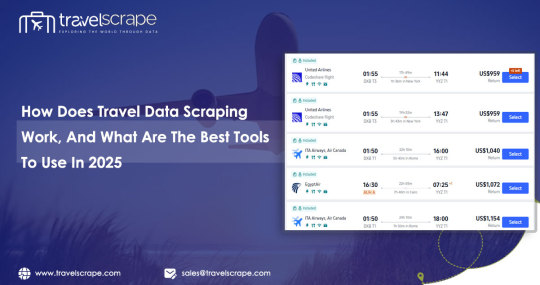
Travel Data Scraping Tools And Techniques For 2025
Master Travel Data Scraping in 2025 with top tools for extracting hotel prices, flight routes, and vacation trends to fuel data-driven travel strategies.
Read More :- https://www.travelscrape.com/how-travel-data-scraping-works-2025.php
#TravelDataScrapingWork#TheBestToolsToUseIn2025#TravelDataIntelligence#VacationRentalDataScraping#FlightPriceDataScraping#TravelScrapingAPI#HotelDataScraping#TravelIndustryWebScraping#TravelAggregators
0 notes
Text
Travel Data Scraping Tools And Techniques For 2025
Introduction
The travel industry generates massive amounts of data every second, from fluctuating flight prices to real-time hotel availability. Businesses harnessing this information effectively gain a significant competitive advantage in the market. Travel Data Scraping has emerged as a crucial technique for extracting valuable insights from various travel platforms, enabling companies to make informed decisions and optimize their strategies.
Modern travelers expect transparency, competitive pricing, and comprehensive options when planning their journeys. To meet these demands, travel companies must continuously monitor competitor pricing, track market trends, and analyze consumer behavior patterns. Given the scale and speed at which travel data changes, extracting this information manually would be impossible.
Understanding the Fundamentals of Travel Data Extraction

Car Rental Data Scraping involves automated information collection from travel websites, booking platforms, and related online sources. This process utilizes specialized software and programming techniques to navigate through web pages, extract relevant data points, and organize them into structured formats for analysis.
The complexity of travel websites presents unique challenges for data extraction. Many platforms implement dynamic pricing algorithms, use JavaScript-heavy interfaces, and employ anti-bot measures to protect their data. Successfully navigating these obstacles requires sophisticated Travel Data Intelligence systems that can adapt to changing website structures and security measures.
Key components of effective travel data extraction include:
Target identification: Determining which websites and data points are most valuable for your business objectives.
Data parsing: Converting unstructured web content into organized, analyzable formats.
Quality assurance: Implementing validation mechanisms to ensure data accuracy and completeness.
Scalability management: Handling large volumes of requests without overwhelming target servers.
The extracted information typically includes pricing data, availability schedules, customer reviews, amenities descriptions, and geographical information. This comprehensive dataset enables businesses to analyze competition, identify market opportunities, and develop data-driven strategies.
Essential Tools and Technologies for 2025

The landscape of modern data extraction has evolved significantly, with advanced solutions offering enhanced capabilities for handling complex travel websites. Python-based frameworks like Scrapy and BeautifulSoup remain popular for custom development, while cloud-based platforms provide scalable solutions for enterprise-level operations.
Vacation Rental Data Scraping services have gained prominence by offering pre-built integrations with major travel platforms. These APIs handle the technical complexities of data extraction while providing standardized access to travel information. Popular providers include RapidAPI, Amadeus, and specialized travel data services focusing on industry needs.
Browser automation tools such as Selenium and Playwright excel at handling JavaScript-heavy websites that traditional scraping methods cannot access. These tools simulate human browsing behavior, making them particularly effective for sites with dynamic content loading and complex user interactions.
Advanced practitioners increasingly adopt machine learning approaches to improve Real-Time Travel Data Extraction accuracy. These systems can adapt to website changes automatically, recognize content patterns more effectively, and handle anti-bot measures with greater sophistication.
Flight Price Data Collection Strategies
Airlines constantly adjust their pricing based on demand, seasonality, route popularity, and competitive factors. Flight Price Data Scraping enables businesses to track these fluctuations across multiple carriers and booking platforms simultaneously. This information proves invaluable for travel agencies, price comparison sites, and market researchers.
Effective flight data collection requires monitoring multiple sources, including airline websites, online travel agencies, and metasearch engines. Each platform may display prices for identical flights due to exclusive deals, booking fees, or promotional campaigns. Comprehensive coverage ensures accurate market representation through Web Scraping Tools For Travel.
Key considerations for flight data extraction include:
Timing optimization: Prices change frequently, requiring strategic scheduling of data collection activities.
Route coverage: Monitoring popular routes while also tracking emerging destinations.
Fare class differentiation: Distinguishing between economy, business, and first-class offerings.
Additional fees tracking: Capturing baggage costs, seat selection charges, and other ancillary fees.
The challenge lies in handling the dynamic nature of flight search results. Many websites generate prices on demand based on search parameters, requiring sophisticated query management and result processing capabilities.
Hotel Industry Data Mining Techniques
The hospitality sector presents unique opportunities for data extraction, with thousands of properties across various booking platforms offering different rates, amenities, and availability windows. Hotel Data Scraping involves collecting information from major platforms like Booking.com, Expedia, Hotels.com, and individual hotel websites.
Property data encompasses room types, pricing structures, guest reviews, amenities lists, location details, and availability calendars. This comprehensive information enables competitive analysis, market positioning, and customer preference identification. Revenue management teams benefit from understanding competitor pricing strategies and occupancy patterns through Travel Scraping API solutions.
Modern hotel data extraction must account for the following:
Multi-platform presence: Hotels often list varying information on multiple booking sites.
Dynamic pricing models: Rates change based on demand, events, and seasonal factors.
Review authenticity: Filtering genuine customer feedback from promotional content.
Geographic clustering: Understanding local market dynamics and competitive landscapes.
These solutions incorporate advanced filtering and categorization features to handle the complexity of hotel data effectively.
Car Rental Market Intelligence
The car rental industry operates with complex pricing models influenced by vehicle availability, location demand, seasonal patterns, and local events. Modern data extraction provides insights into fleet availability, pricing strategies, and market trends across different geographic regions.
Major rental companies like Hertz, Avis, Enterprise, and Budget maintain extensive online presence with real-time inventory management systems. Extracting data from these platforms requires understanding their booking workflows and availability calculation methods using Best Travel Data Extraction Software.
Essential data points for car rental analysis include:
Vehicle categories: From economy cars to luxury vehicles and specialty equipment.
Location-based pricing: Airport versus city locations often have different rate structures.
Seasonal variations: Holiday periods and local events significantly impact availability and costs.
Add-on services: Insurance options, GPS rentals, and additional driver fees.
The challenge is the relationship between pickup/dropoff locations, rental duration, and vehicle availability. These factors interact in complex ways that require sophisticated data modeling approaches supported by Travel Data Intelligence systems.
Vacation Rental Platform Analysis
The rise of platforms like Airbnb, VRBO, and HomeAway has created new opportunities for travel data extraction. These platforms collect information about property listings, host profiles, guest reviews, pricing calendars, and booking availability.
Unlike traditional hotels, vacation rentals operate with unique pricing models, often including cleaning fees, security deposits, and variable nightly rates. Understanding these cost structures requires comprehensive Travel Data Scraping capabilities and analysis.
Key aspects of vacation rental data include:
Property characteristics: Number of bedrooms, amenities, location ratings, and unique features.
Host information: Response times, acceptance rates, and guest communication patterns.
Pricing strategies: Base rates, seasonal adjustments, and additional fee structures.
Market saturation: Understanding supply and demand dynamics in specific locations.
Real-Time Travel Data Extraction becomes particularly important for vacation rentals due to the personal nature of these properties and the impact of local events on availability and pricing.
Building Effective Data Intelligence Systems

Modern intelligence systems transform raw extracted information into actionable business insights. This process involves data cleaning, normalization, analysis, and visualization to support decision-making across various business functions.
Successful intelligence systems integrate data from multiple sources to provide comprehensive market views. They combine pricing information with availability data, customer sentiment analysis, and competitive positioning metrics to create holistic business intelligence dashboards using Web Scraping Tools For Travel.
Key components of effective systems include:
Data quality management: Ensuring accuracy, completeness, and consistency across all data sources.
Automated analysis: Implementing algorithms to identify trends, anomalies, and opportunities.
Customizable reporting: Providing stakeholders with relevant, timely, and actionable information.
Predictive modeling: Using historical data to forecast future trends and market conditions.
The integration of artificial intelligence and machine learning technologies enhances the capability of Travel Scraping API systems to provide deeper insights and more accurate predictions.
Real-Time Data Processing Capabilities
Modern travel businesses require up-to-the-minute information to remain competitive in fast-paced markets. Advanced processing systems operate continuously, monitoring changes across multiple platforms and updating business intelligence systems accordingly.
The technical infrastructure for real-time processing must handle high-frequency data updates while maintaining system performance and reliability. This requires distributed computing approaches, efficient data storage solutions, and robust error handling mechanisms Best Travel Data Extraction Software supports.
Critical aspects of real-time systems include:
Low-latency processing: Minimizing delays between data availability and business intelligence updates.
Scalable architecture: Handling varying data volumes and processing demands.
Fault tolerance: Maintaining operations despite individual component failures.
Data freshness: Ensuring information accuracy and relevance for time-sensitive decisions.
Advanced Flight Price Data Scraping systems exemplify these capabilities by providing instant updates on pricing changes across multiple airlines and booking platforms.
Legal and Ethical Considerations
Modern Hotel Data Scraping tools must navigate legal boundaries, adhering to website terms of service and data protection laws. As data extraction regulations evolve, businesses must stay compliant while gathering valuable travel insights.
Best practices include respecting robots.txt files, implementing reasonable request rates, and avoiding actions that could disrupt website operations. Many travel companies now offer official APIs as alternatives to scraping, providing structured access to their data while maintaining control over usage terms.
Important considerations include:
Terms of service compliance: Understanding and adhering to platform-specific usage policies.
Data privacy regulations: Ensuring compliance with GDPR, CCPA, and other privacy laws.
Rate limiting: Implementing respectful crawling practices that don't overwhelm target servers.
Attribution requirements: Properly crediting data sources when required.
Data scraping in the hotel sector must prioritize guest privacy and protect reservation confidentiality. Similarly, Car Rental Data Scraping should consider competitive pricing and ensure it doesn't interfere with booking platforms.
Future Trends and Innovations

The evolution of travel data extraction is rapidly advancing, driven by AI, machine learning, and cloud innovations. Amid this progress, Travel Data Intelligence unlocks deeper insights, greater accuracy, and scalable solutions for travel businesses.
Emerging trends such as natural language processing for review analysis, computer vision for extracting image-based data, and blockchain for secure data verification and sharing are transforming the landscape. These innovations enhance the value and scope of Vacation Rental Data Scraping systems across all market segments.
How Travel Scrape Can Help You?
We provide comprehensive data extraction solutions tailored to your business needs. Our expert team understands the complexities of Travel Data Scraping and offers cutting-edge tools to give you a competitive advantage.
Custom API Development: We create specialized solutions that integrate seamlessly with your existing systems and workflows.
Multi-Platform Coverage: Our services encompass data collection across hundreds of travel websites and booking platforms.
Real-Time Intelligence: Implement continuous monitoring capabilities that keep your business informed of market changes as they happen.
Advanced Analytics: Transform raw data into actionable insights using sophisticated analysis and reporting tools.
Scalable Infrastructure: Our solutions grow with your business, handling increased data volumes and additional platforms.
Compliance Management: We ensure all data collection activities adhere to legal requirements and industry best practices.
24/7 Support: Our dedicated team provides continuous monitoring and technical support to maintain optimal system performance.
Conclusion
The travel industry's data-driven transformation requires sophisticated information collection and analysis approaches. Travel Data Scraping has become an essential capability for businesses seeking to understand market dynamics, optimize pricing strategies, and deliver superior customer experiences. Modern Travel Aggregators rely heavily on comprehensive data extraction systems to provide accurate, timely information to their users.
Success in today's competitive environment demands robust Travel Industry Web Scraping capabilities that can adapt to changing technologies and market conditions. By implementing the right tools, strategies, and partnerships, travel businesses can harness the power of data to drive growth and innovation.
Ready to transform your travel business with comprehensive data intelligence? Contact Travel Scrape today to discover how we can provide the competitive advantage you need.
Read More :- https://www.travelscrape.com/how-travel-data-scraping-works-2025.php
#TravelDataScrapingWork#TheBestToolsToUseIn2025#TravelDataIntelligence#VacationRentalDataScraping#FlightPriceDataScraping#TravelScrapingAPI#HotelDataScraping#TravelIndustryWebScraping#TravelAggregators
0 notes
Text
Travel Data Scraping Tools And Techniques For 2025
Master Travel Data Scraping in 2025 with top tools for extracting hotel prices, flight routes, and vacation trends to fuel data-driven travel strategies.
Read More :- https://www.travelscrape.com/how-travel-data-scraping-works-2025.php
#TravelDataScrapingWork#TheBestToolsToUseIn2025#TravelDataIntelligence#VacationRentalDataScraping#FlightPriceDataScraping#TravelScrapingAPI#HotelDataScraping#TravelIndustryWebScraping#TravelAggregators
0 notes
Text

Choosing Between APIs vs Web Scraping Travel Data Tools
This report compares APIs vs Web Scraping Travel Data to uncover the most scalable and practical method for gathering dynamic travel-related information.
Read More :- https://www.travelscrape.com/apis-vs-web-scraping-travel-data.php
#APIsVsWebScrapingTravelData#ScalableApproachToDataCollection#TravelDataScrapingServices#CustomTravelDataSolutions#TravelDataIntelligence#TravelScrapingAPI#TravelReviewDataIntelligence#TravelAggregators#TravelIndustryWebScraping
0 notes
Text
Choosing Between APIs vs Web Scraping Travel Data Tools
Introduction
The APIs vs Web Scraping Travel Data landscape presents critical decisions for businesses seeking comprehensive travel intelligence. This comprehensive analysis examines the strategic considerations between traditional API integrations and advanced web scraping methodologies for travel data acquisition. Based on extensive research across diverse travel platforms and data collection scenarios, this report provides actionable insights for organizations evaluating Scalable Travel Data Extraction solutions. The objective is to guide travel companies, OTAs, and data-driven businesses toward optimal data collection strategies that balance performance, cost-effectiveness, and operational flexibility. Modern travel businesses require sophisticated approaches to data acquisition, with both Web Scraping vs API Data Collection methodologies offering distinct advantages depending on specific use cases.
Shifting Paradigms in Travel Data Collection Methods
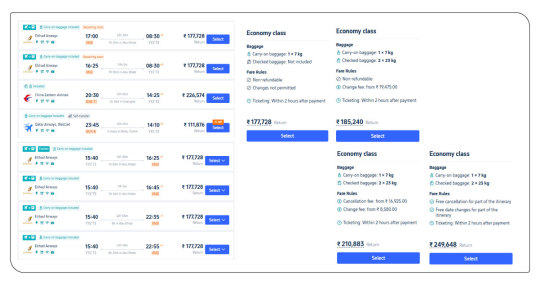
The landscape of travel data collection has evolved significantly with the emergence of sophisticated API vs Scraper for Ota Data solutions. The primary drivers shaping this evolution include the increasing demand for real-time information, the growing complexity of travel platforms, and the need for scalable data infrastructure that can handle massive volumes of travel-related content.
Travel Data Scraping Services have become increasingly sophisticated, allowing businesses to extract comprehensive datasets from multiple sources simultaneously. These services provide granular access to pricing information, availability data, customer reviews, and promotional content across various travel platforms.
Meanwhile, API-based solutions offer structured access to travel data through official channels, providing more reliable and consistent data streams. Integrating machine learning and artificial intelligence has enhanced both approaches, enabling more intelligent data extraction and processing capabilities that support Scalable Travel Data Extraction requirements.
Methodology and Scope of Data Analysis
The data for this report was collected through comprehensive testing of API and web scraping approaches across 100+ travel platforms worldwide. By systematically evaluating Data Scraping vs API Travel Sites, we analyzed performance metrics, cost structures, implementation complexity, and data quality across major booking platforms, including Booking.com, Expedia, Airbnb, and specialized Travel Aggregates.
We evaluated both methods across key parameters—data freshness, extraction speed, scalability, and maintenance. Our Custom Travel Data Solutions framework also considered data accuracy, update frequency, cost-efficiency, and technical complexity to ensure a well-rounded comparison.
Key Factors Influencing Data Collection Strategy Selection
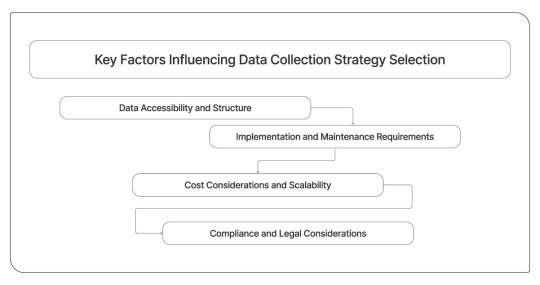
Understanding these factors is essential for making informed decisions about Real-Time Travel Data Collection strategies.
Data Accessibility and Structure
Implementation and Maintenance Requirements
Cost Considerations and Scalability
Compliance and Legal Considerations
Table 1: Performance Comparison - APIs vs Web Scraping Methods
MetricAPI ApproachWeb Scraping ApproachHybrid SolutionData Accuracy Rate98.5%92.3%96.8%Average Response Time (ms)2501,200450Implementation Time (hours)4012080Monthly Maintenance (hours)52515Data Coverage Completeness75%95%90%Cost per 1M Requests ($)15050100
Description
This analysis highlights the trade-offs in data collection: APIs deliver speed and reliability, while web scraping ensures broader coverage at lower upfront costs. For effective implementation of Custom Travel Data Solutions, it’s essential to weigh these factors. APIs suit high-accuracy, time-sensitive needs while scraping offers scalable data access with more maintenance. Hybrid models blend both for robust, enterprise-ready performance.
Challenges and Opportunities in Travel Data Collection
Modern travel businesses face complex decisions when implementing data collection strategies. While APIs provide stability and official support, they may limit access to comprehensive competitive intelligence and real-time market insights that drive strategic decisions.
Rate limiting represents a significant challenge for API-based approaches, particularly for businesses requiring high-volume data collection for Travel Review Data Intelligence and market analysis. Additionally, API availability varies significantly across platforms, with some major travel sites offering limited or no official API access.
Web scraping presents technical challenges, including anti-bot measures, dynamic content loading, and frequent website modifications that require ongoing technical maintenance. However, it offers unparalleled flexibility for accessing comprehensive datasets and competitive intelligence.
Growing demand for adaptive, intelligent data collection is reshaping the market. Businesses leveraging advanced strategies like Travel Data Intelligence gain faster insights and a sharper edge by staying ahead of shifting trends.
Table 2: Regional Data Collection Trends and Projections
RegionAPI AdoptionScraping Usage RateHybrid ImplementationGrowth ProjectionNorth America65%85%45%22%Europe70%80%50%28%Asia Pacific55%90%35%35%Latin America45%75%25%18%
Description
Regional trends show varied adoption of the Travel Scraping API, driven by local regulations and tech infrastructure. Asia-Pacific leads in growth potential, North America shows strong API usage, and Europe excels in hybrid strategies, balancing compliance with deep market insights. Overall, the demand for advanced data collection is rising globally.
Future Directions in Travel Data Collection

The future of data collection lies in smarter systems that elevate API and web scraping efficiency. By embedding advanced machine learning into extraction workflows, businesses can boost accuracy and reduce upkeep, benefiting platforms like Travel Scraping API and beyond.
The emergence of standardized travel data formats and industry-wide API initiatives suggests a future where structured data access becomes more universally available. However, the continued importance of comprehensive competitive intelligence ensures that web scraping will remain a critical component of enterprise data strategies.
Cloud-based data collection tools level the playing field, empowering small businesses to adopt enterprise-grade solutions without needing heavy infrastructure. This shift enhances capabilities like Travel Review Data Intelligence and broadens access to scalable data extraction.
Conclusion
The decision between APIs vs Web Scraping Travel Data depends on specific business requirements, technical capabilities, and strategic objectives. This report, through a comprehensive analysis of both approaches, demonstrates that neither methodology provides a universal solution for all travel data collection needs.
Travel Aggregators and major booking platforms continue to evolve their data access policies, creating new opportunities and challenges for data collection strategies. The most successful implementations often combine both approaches, leveraging APIs for core operational data while utilizing Travel Industry Web Scraping for comprehensive market intelligence.
Contact Travel Scrape today to discover how our advanced data collection solutions can transform your travel business intelligence and drive competitive advantage in the dynamic travel industry.
Read More :- https://www.travelscrape.com/apis-vs-web-scraping-travel-data.php
#APIsVsWebScrapingTravelData#ScalableApproachToDataCollection#TravelDataScrapingServices#CustomTravelDataSolutions#TravelDataIntelligence#TravelScrapingAPI#TravelReviewDataIntelligence#TravelAggregators#TravelIndustryWebScraping
0 notes
Text
Choosing Between APIs vs Web Scraping Travel Data Tools
This report compares APIs vs Web Scraping Travel Data to uncover the most scalable and practical method for gathering dynamic travel-related information.
Read More :- https://www.travelscrape.com/apis-vs-web-scraping-travel-data.php
#APIsVsWebScrapingTravelData#ScalableApproachToDataCollection#TravelDataScrapingServices#CustomTravelDataSolutions#TravelDataIntelligence#TravelScrapingAPI#TravelReviewDataIntelligence#TravelAggregators#TravelIndustryWebScraping
0 notes
Text

Hotel Competitor Price Scraping Led To 25% Growth Rate
By adopting Hotel Competitor Price Scraping, a hotel chain stayed ahead of the market curve, refining its pricing strategy and increasing occupancy by 25%.
Read More :- https://www.travelscrape.com/hotel-growth-through-price-scraping.php
#HotelCompetitorPriceScraping#HotelDataIntelligence#HotelDataScraping#CustomTravelDataSolutions#HotelRoomPriceTrendsDataset#HotelAvailabilityForecastDatasets#TravelScrapingAPI#TravelIndustryWebScraping#TravelAggregators
0 notes
Text
Hotel Competitor Price Scraping Led To 25% Growth Rate
Introduction
In the rapidly evolving hospitality sector, hotel operators encounter unprecedented challenges in establishing optimal pricing frameworks. Hotel Competitor Price Scraping has become an indispensable methodology for industry leaders aiming to enhance revenue streams while securing market dominance. With approximately 15 million hotel rooms available across global booking platforms, depending solely on traditional pricing methods or basic market intuition proves increasingly inadequate. Progressive hoteliers are constructing advanced revenue optimization systems powered by Hotel Pricing Intelligence technologies.
This case study highlights how a leading hotel chain leveraged advanced Hotel Data Intelligence and analytics to transform its pricing strategy. By implementing our integrated data platform, they significantly improved occupancy rates, room pricing, and overall financial performance.
Our Client
Sterling Hospitality Group operates an impressive collection of 42 upscale hotel properties distributed across key metropolitan markets throughout the Eastern United States. Despite delivering superior guest experiences, their property network experienced an average occupancy rate of merely 52%, significantly trailing industry performance standards. This performance deficit underscored their critical requirement for Hotel Competitor Price Scraping implementations to accelerate revenue expansion.
Their traditional pricing methodology depended extensively on legacy data analysis and elementary market research conducted through periodic manual competitor surveillance. Without advanced Hotel Data Scraping infrastructure, management teams lacked a comprehensive understanding of essential market forces, including seasonal demand variations, competitor rate modifications, and developing consumer behavior patterns.
Recognizing that conventional pricing methodologies constrain their growth potential, Sterling Hospitality partnered with Custom Travel Data Solutions to establish a more analytical, technology-driven strategy. This transformation enhanced strategic planning and generated measurable improvements across their hotel portfolio.
Challenges in the Hotel Industry
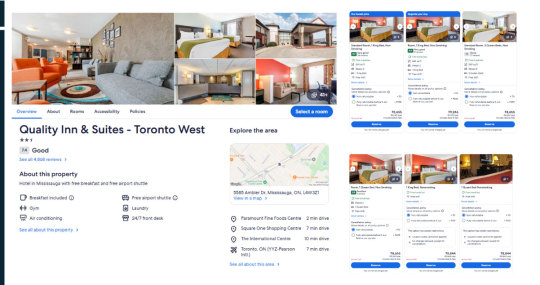
The hospitality landscape faces evolving complexities that demand more innovative data-driven strategies:
● Pricing Insight Gaps
Hotel operators lack essential Real-Time Hotel Pricing Data, risking missed revenue opportunities and inconsistent rate setting due to poor awareness of market dynamics and seasonal demand changes.
● Demand Forecast Blocks
Limited analytical tools hinder Hotel Occupancy Analytics, reducing accuracy in demand prediction and flexibility in adapting rates to shifting booking trends and guest behavior patterns.
● Visibility Sync Issues
Dynamic platform changes demand constant Hotel Rate Parity Monitoring to ensure competitive placement, drive booking conversions, and maintain consistent pricing across all OTAs.
● Manual Load Drains
Lack of Hotel Revenue Management automation increases manual workloads, delays pricing decisions, and diverts teams from improving guest experiences or focusing on strategic growth efforts.
Our Approach

We empowered Sterling Hospitality with deep market insights using a data-driven, analytics-first approach enhanced by machine learning and automation.
● Insight Nexus Grid
This centralized dashboard merges vital data streams, enabling Web Scraping For Hotel Pricing insights for fast evaluation of booking behavior, facility trends, and market pricing analytics.
● Rev Pulse Optimizer
Using historical trends and current patterns, Travel Data Scraping Solutions drives intelligent pricing strategies that balance occupancy rates and increase revenue per available hotel room.
● Strat Watch Console
This tool tracks market shifts and evaluates pricing impact by applying ongoing analytics through the Hotel Data Extraction API to ensure adaptive, aligned revenue decisions.
● Sync Link Framework
This structure automates data flows through embedded system access and connections to the Hotel Room Price Trends Dataset, eliminating manual input and enhancing operational precision in real-time.
● Foresight Yield Core
With predictive modeling powered by Hotel Availability Forecast Datasets, this tool anticipates demand fluctuations 120 days out to effortlessly unlock peak-time pricing opportunities.
Results Achieved

Our tailored solution, powered by robust Hotel Data Intelligence, delivered measurable success across Sterling Hospitality’s properties:
● Stay Surge Strategy
By applying a strategic Travel Scraping API, occupancy rose from 52% to 77%, enhancing slow-period bookings through targeted yield management and advanced optimization techniques.
● Profit Pulse Plan
Sterling Hospitality grew annual revenue by 118% using Hotel Competitor Price Scraping to adjust nightly rates and outperform occupancy gains across seasonal demand cycles.
● Smart Ops Shift Model
By automating decisions with Hotel Pricing Intelligence, manual pricing tasks dropped 82%, allowing teams to refocus on guest experience and scaling operational productivity.
● Peak Yield Event Grid
Forecasting 31 premium periods via Real-Time Hotel Pricing Data enabled timely rate adjustments and secured near-full bookings during key revenue-driving event windows.
● Rank Rise Visibility Flow
Search rankings improved by 73% as Hotel Occupancy Analytics guided dynamic pricing, driving organic traffic and boosting platform visibility for sustained booking growth.
Client's Testimonial
"The implementation of Hotel Competitor Price Scraping from Travel Scrape has fundamentally transformed our operational approach. With detailed market analysis powered by Hotel Rate Parity Monitoring, we've enhanced our pricing strategies across all locations and seasons, achieving remarkable financial growth. This innovation has provided us with the strategic advantage essential in today's demanding hospitality environment."
– Sarah Rodriguez, Revenue Strategy Director, Sterling Hospitality Group
Conclusion
Implementing advanced Hotel Competitor Price Scraping technologies signifies a transformative evolution in how successful hotel operators approach pricing strategy in contemporary competitive markets. Utilizing comprehensive information from major Travel Aggregators allows hotel managers to execute genuinely informed decisions that optimize occupancy and revenue generation.
Incorporating sophisticated Travel Industry Web Scraping platforms enables hotel operators to access accurate, actionable market intelligence that supports strategic pricing decisions and delivers quantifiable performance enhancements across their property portfolios.
Unlock more innovative pricing strategies for your hotel with expert insights. Contact Travel Scrape for a personalized strategy session and see how our Hotel Room Price Trends Dataset and market intelligence tools can refine your pricing, boost competitiveness, and drive profitability.
Read More :- https://www.travelscrape.com/hotel-growth-through-price-scraping.php
#HotelCompetitorPriceScraping#HotelDataIntelligence#HotelDataScraping#CustomTravelDataSolutions#HotelRoomPriceTrendsDataset#HotelAvailabilityForecastDatasets#TravelScrapingAPI#TravelIndustryWebScraping#TravelAggregators
0 notes
Text
Hotel Competitor Price Scraping Led To 25% Growth Rate
By adopting Hotel Competitor Price Scraping, a hotel chain stayed ahead of the market curve, refining its pricing strategy and increasing occupancy by 25%.
Read More :- https://www.travelscrape.com/hotel-growth-through-price-scraping.php
#HotelCompetitorPriceScraping#HotelDataIntelligence#HotelDataScraping#CustomTravelDataSolutions#HotelRoomPriceTrendsDataset#HotelAvailabilityForecastDatasets#TravelScrapingAPI#TravelIndustryWebScraping#TravelAggregators
0 notes
Text

Multi-Modal Travel Data Scraping Powers Smart Journeys
Multi-Modal Travel Data Scraping revolutionizes journey planning by combining diverse transport modes to create efficient and connected travel experiences.
Read More :- https://www.travelscrape.com/multi-modal-travel-data-scraping.php
#TravelDataScraping#TravelDataIntelligence#TravelReviewDataIntelligence#CustomTravelDataSolutions#TopTravelDestinationsDataset#TravelScrapingAPI#MultiModalTravelDataScraping#TravelIndustryWebScraping#TravelAggregators
0 notes
Text
Multi-Modal Travel Data Scraping Powers Smart Journeys
Introduction
The travel industry has undergone a remarkable transformation in recent years, driven by technological advancements and changing consumer expectations. Today's travelers demand more than just basic booking functionality – they seek comprehensive, efficient, and integrated solutions that can seamlessly connect various modes of transportation. This evolution has given rise to Multi-Modal Travel Data Scraping , a revolutionary approach reshaping how we plan, book, and experience travel.
Gone are the days when travelers had to navigate multiple platforms, compare prices across different websites, and manually coordinate various journey segments. Modern Travel Journey Data collection and analysis have created sophisticated platforms that can aggregate information from buses, trains, flights, ferries, and other transportation modes into a user-friendly interface.
The Foundation of Modern Travel Booking Systems

Modern travel booking systems are built on real-time data integration, seamless connectivity across transport modes, and intelligent automation enabling travelers to plan complex journeys with a single, unified experience.
1. Understanding Multi-Modal Transportation
Multi-modal transportation refers to using multiple modes of transport during a single journey. For example, travelers could fly to a destination, take a train to the city center, and then use a bus or ferry for the final leg of the trip. Traditional booking systems treated each mode of transport as a separate entity, creating fragmented experiences for travelers.
Multi-Transport Travel Booking systems have revolutionized this approach by creating unified platforms that handle complex itineraries involving multiple transportation providers. These systems rely heavily on comprehensive data collection and real-time information processing to deliver accurate, up-to-date booking options.
2. The Role of Data Integration
The success of modern travel platforms depends on their ability to process and integrate vast amounts of transportation data. Seamless Travel Booking Systems require constant access to:
Real-time pricing information from airlines, railway companies, bus operators, and ferry services.
Schedule updates and availability across all transportation modes.
Route optimization data for efficient journey planning.
Customer review and rating information for informed decision-making.
This integration is possible through sophisticated Bus, Train, Flight Combined Booking Data collection processes that continuously monitor and update information from thousands of transportation providers worldwide.
The Technology Behind Seamless Travel Experiences
Seamless travel experiences are powered by sophisticated technologies that integrate real-time transport data and intelligent analytics—ensuring travelers receive up-to-the-minute information and personalized recommendations for every step of their journey.
1. Real-Time Data Processing
One of the most critical aspects of modern travel booking systems is Real-Time Transport Data Integration. This technology ensures that travelers can access the most current information when booking.
The system continuously monitors:
Flight delays and cancellations across major airlines
Train schedule modifications and platform changes
Bus route adjustments due to traffic or weather conditions
Ferry service disruptions caused by maritime conditions
This real-time approach prevents the frustration of booking transportation that may be unavailable or has undergone significant changes since the initial data was collected.
2. Advanced Analytics and Intelligence
Modern Travel Booking Data systems employ sophisticated analytics to give travelers intelligent recommendations. These systems analyze historical patterns, seasonal trends, and current market conditions to offer:
Dynamic pricing predictions for optimal booking timing
Alternative route suggestions when primary options are unavailable
Multi-modal combinations that optimize for time, cost, or comfort
Personalized recommendations based on traveler preferences and history
Comprehensive Data Sources and Integration

This refers to unifying diverse transport-related data streams across modes, regions, and providers into a coherent system that fuels seamless user experiences and efficient travel planning.
1. Transportation Mode Coverage
Integrated Transport Data systems must accommodate various transportation options to provide comprehensive service. This includes traditional modes like flights and trains and specialized services such as Ferry And Rail Insights for maritime and scenic railway journeys.
The integration of diverse transportation data sources requires sophisticated Travel Journey Analytics that can:
Normalize data formats from different providers
Reconcile scheduling conflicts between connecting services
Optimize transfer times for seamless connections
Account for regional variations in transportation systems
2. Service Provider Partnerships
Effective Data Scraping Services for travel applications require partnerships and integrations with hundreds of transportation providers. These relationships ensure access to comprehensive inventory and real-time updates, which are essential for accurate booking information.
The Impact on Modern Travel Planning
Modern travel planning is no longer a tedious task of juggling multiple sources—it's now a connected, data-driven experience shaped by innovative tools and real-time insights.
Modern Mobility Solutions have transformed the travel planning experience from a fragmented, time-consuming process into a streamlined, efficient journey. Travelers can now:
Compare prices across multiple transportation modes simultaneously.
Book complex itineraries involving multiple providers through a single platform.
Receive real-time updates throughout their journey.
Access comprehensive travel information including reviews, amenities, and services.
2. Intelligent Route Optimization
Travel Data Intelligence systems can analyze millions of route combinations to suggest the most efficient travel options.
These systems consider factors such as:
Total journey time including transfers and waiting periods
Cost optimization across different booking combinations
Comfort preferences such as seat selection and amenities
Environmental impact for eco-conscious travelers
Leveraging Customer Insights and Reviews

Unlocking actionable insights through real-time customer feedback and review analytics to enhance travel decision-making and personalization.
1. Review Data Integration
Travel Review Data Intelligence is crucial in helping travelers make informed decisions. Modern booking platforms integrate review data from multiple sources to provide comprehensive insights about:
Transportation provider quality and reliability
Route-specific experiences and recommendations
Seasonal considerations that may affect travel comfort
Accessibility information for travelers with special needs
2. Personalized Recommendations
Advanced analytics enable Custom Travel Data Solutions that can provide personalized recommendations based on individual traveler profiles, preferences, and historical booking patterns.
Destination and Market Intelligence
Destination and Market Intelligence strategically uses location-based travel data and market behavior insights to support more innovative travel planning, optimize offerings, and enhance customer experiences on booking and travel platforms.
1. Comprehensive Destination Data
Top Travel Destinations Dataset integration enables booking platforms to provide valuable context about destinations, including:
Seasonal travel patterns and optimal booking times
Local transportation options and connectivity
Popular attractions and points of interest
Regional travel requirements and documentation needs
This information helps travelers make more informed decisions about their journey, not just the transportation components.
2. Market Trend Analy
Travel platforms increasingly rely on data-driven strategies to stay competitive and responsive to shifting consumer behavior. Through comprehensive data analysis, they can:
Detect evolving traveler preferences, such as rising interest in eco-tourism or off-season travel.
Monitor emerging destinations gaining popularity.
Respond proactively to seasonal demand shifts and regional events.
Technical Infrastructure and API Integration
Efficient travel platforms depend on seamless technical foundations and well-integrated APIs to deliver end users fast, accurate, and reliable services.
1. Robust API Architecture
Modern travel booking systems rely on sophisticated Travel Scraping API infrastructure to handle high-volume data requests while maintaining system performance and reliability.
These APIs must support:
Real-time data synchronization across multiple transportation providers
Scalable architecture to handle peak booking periods
Redundancy and failover systems to ensure continuous service availability
Security protocols to protect sensitive traveler and payment information
2. Data Quality and Accuracy
Maintaining data quality across multiple sources requires continuous monitoring and validation processes that ensure travelers receive accurate, up-to-date information for their booking decisions.
The Future of Multi-Modal Travel

A seamlessly connected transportation ecosystem that unites various travel modes, such as public transit, ride-sharing, air, rail, micromobility, and more, into a single, integrated journey experience driven by real-time data, sustainability, and intelligent systems.
Emerging TechnologiesEmerging technologies like artificial intelligence, machine learning, and predictive analytics are set to redefine the future of travel booking. With enhanced route planning, more intelligent recommendations, and proactive management, these tools, combined with Custom Travel Data Solutions, will drive more personalized and efficient travel experiences.
Sustainability and Environmental ConsiderationsGrowing awareness of environmental impact is driving demand for travel solutions that can optimize routes for carbon efficiency and provide travelers with information about the environmental impact of their transportation choices.
Integration with Smart City InfrastructureFuture travel booking systems will integrate with smart city infrastructure to provide real-time information about urban transportation options, traffic conditions, and alternative routing based on current city conditions.
How Travel Scrape Can Help You?
We specialize in providing comprehensive Multi-Modal Travel Data Scraping hat powers next-generation booking platforms. Our services enable travel businesses to create seamless, integrated booking experiences that meet modern traveler expectations.
Our Core Services Include:
Advanced Data Collection Infrastructure: Our systems gather information from hundreds of transportation providers, ensuring comprehensive coverage of flights, trains, buses, ferries, and other transportation modes across global markets.
Real-Time Integration Capabilities: We provide seamless integration of live pricing, availability, and schedule information, enabling your platform to offer current and accurate booking options to your customers.
Custom Analytics Solutions: Our Travel Journey Analytics tools help you understand customer behavior, optimize route recommendations, and identify new market opportunities through detailed data analysis.
Scalable API Infrastructure: Our robust Travel Scraping API solutions can handle high-volume requests while maintaining data accuracy and system reliability, supporting businesses of all sizes.
Specialized Market Intelligence: We provide targeted insights for specific transportation modes, including Ferry And Rail Insights, helping you optimize offerings for diverse travel preferences and regional requirements.
Our platform enables businesses to focus on customer service and business growth while we handle the complex technical aspects of multi-modal travel data integration and management.
Conclusion
Multi-Modal Travel Data Scraping has fundamentally transformed the travel industry by enabling seamless, integrated booking experiences that meet the evolving needs of modern travelers. As Travel Aggregators continue to enhance their platforms with comprehensive data integration and real-time processing capabilities, the travel experience becomes increasingly streamlined and user-friendly.
The integration of Travel Industry Web Scraping technologies will continue to drive innovation, making complex travel planning accessible to everyone while opening new opportunities for businesses to serve the evolving needs of modern travelers.
Ready to transform your travel platform with comprehensive multi-modal data integration? Contact Travel Scrape today to discover how advanced data solutions can power your seamless booking journey.
Read More :- https://www.travelscrape.com/multi-modal-travel-data-scraping.php
#TravelDataScraping#TravelDataIntelligence#TravelReviewDataIntelligence#CustomTravelDataSolutions#TopTravelDestinationsDataset#TravelScrapingAPI#MultiModalTravelDataScraping#TravelIndustryWebScraping#TravelAggregators
0 notes